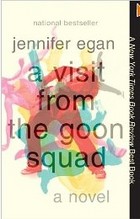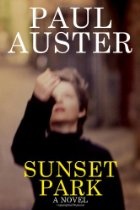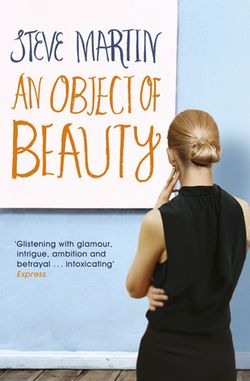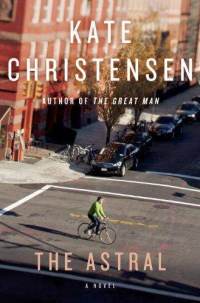Summer’s Books
So far it’s been a good summer for reading novels. Insomnia can contribute to the quantity of reading, if not the quantity of retention. If you need a good read, you may be able to find one to suit you below. Presented in our order of preference, though the last one is probably the closest to a “Summer Read” of the lot.

A Visit From the Goon Squad by Jessica Egan (2010 Pulitzer Prize for Fiction–and which we unprecedentedly read twice–in a row)
Those Pulitzer folks rarely get it wrong, and Egan’s book is no exception. This book won this year’s Pulitzer for fiction, and it is a Lefort favorite in part because it streams music and the music industry within its lines. You can feel the fab Mabuhay and the Dead Kennedys along the way, and the socially engineered performance at the end. Egan uses the music industry in this novel as a case study for this world’s seismic shift from the analog to the digital age (near the end of the book, 75 pages are allotted to a child’s powerfully poetic Powerpoint presentation). But the book is also a carefully crafted character study. Egan flashes forwards and back in time to develop those characters and illumine the digital evolution’s effects on our society, and at times it can feel that the novel is more a collection of short stories barely tethered together by some through-lines. The net effect can be intermittently confusing and jarring, but in the end one realizes the magic that Egan has conjured. The themes are not for the faint of heart (sex and drugs and rock n’ roll, etc.), but the writing and affect are profound.
Some lines from the book we particularly enjoyed:
About a therapist: “[H]e was old school inscrutable, to the point that Sasha couldn’t tell if he was gay or straight, if he’d written famous books, or if (as she sometimes suspected) he was one of those escaped cons who impersonate surgeons and wind up leaving their operating tools inside people’s skulls.”
A record producer reminiscing about his mentor: “[Bennie] remembered his mentor, Lou Kline, telling him in the nineties that rock and roll had peaked at Monterey Pop They’d been in Lou’s house in LA with its waterfalls, the pretty girls Lou’s always had, his car collection out front, and Bennie had looked into his idol’s face and thought, You’re finished. Nostalgia was the end–everyone knew that.”
The foregoing expresses what drives us to keep reaching out for new music. Of course we can’t ignore the canonical music past, but we also shouldn’t settle in on the familiar. Instead we need to be challenged, even shocked, by new music, and continue to grow. Or else you’ll be finished. Who was it said: “He not busy being born is busy dying”?
And from our favorite chapter in the book, a journalistic “report” by reporter Jules Jones about his interview with young starlet, Kitty Jackson, which does not end well: “And since the ten minutes of badinage I proceed to exchange with Kitty are simply not worth relating, I’ll mention instead (in the footnote-ish fashion [Lefort: the footnotes are fantastically written] that injects a whiff of cracked leather bindings into pop-cultural observation) that when you’re a young movie star with blondish hair and a highly recognizable face from that recent movie whose grosses can only be explained by the conjecture that every person in America saw it twice, people treat you in a manner that is somewhat different…from the way they treat, say, a balding, stoop-shouldered, slightly eczematous guy approaching middle age.”
The publisher has this to say about the book:
“Jennifer Egan’s spellbinding interlocking narratives circle the lives of Bennie Salazar, an aging former punk rocker and record executive, and Sasha, the passionate, troubled young woman he employs. Although Bennie and Sasha never discover each other’s pasts, the reader does, in intimate detail, along with the secret lives of a host of other characters whose paths intersect with theirs, over many years, in locales as varied as New York, San Francisco, Naples, and Africa.
We first meet Sasha in her mid-thirties, on her therapist’s couch in New York City, confronting her long-standing compulsion to steal. Later, we learn the genesis of her turmoil when we see her as the child of a violent marriage, then as a runaway living in Naples, then as a college student trying to avert the suicidal impulses of her best friend. We plunge into the hidden yearnings and disappointments of her uncle, an art historian stuck in a dead marriage, who travels to Naples to extract Sasha from the city’s demimonde and experiences an epiphany of his own while staring at a sculpture of Orpheus and Eurydice in the Museo Nazionale. We meet Bennie Salazar at the melancholy nadir of his adult life — divorced, struggling to connect with his nine-year-old son, listening to a washed-up band in the basement of a suburban house — and then revisit him in 1979, at the height of his youth, shy and tender, reveling in San Francisco’s punk scene as he discovers his ardor for rock and roll and his gift for spotting talent. We learn what became of his high school gang — who thrived and who faltered — and we encounter Lou Kline, Bennie’s catastrophically careless mentor, along with the lovers and children left behind in the wake of Lou’s far-flung sexual conquests and meteoric rise and fall.
A Visit from the Goon Squad is a book about the interplay of time and music, about survival, about the stirrings and transformations set inexorably in motion by even the most passing conjunction of our fates. In a breathtaking array of styles and tones ranging from tragedy to satire to PowerPoint, Egan captures the undertow of self-destruction that we all must either master or succumb to; the basic human hunger for redemption; and the universal tendency to reach for both — and escape the merciless progress of time — in the transporting realms of art and music.”

“Next” by James Hynes (Believer Magazine’s Book of 2010)
Believer Mag knows what it’s talking about. “Next” is both a serious and a comedic look at middle-age, relationships and the state of the modern world. Who cannot read themselves in some pages or lines of this book? Hynes mesmerizes throughout, but nothing could prepare us for the implausible, but perfect, ending. We loved this book, which is thus described on the author’s website:
“Descending on a plane into Austin, Texas, Kevin Quinn is worried about his stifling job, the younger girlfriend he’s lucky to have but can’t commit to, his rapidly encroaching late middle age, and the terrorist attacks in Europe that rocked the world just days ago. But as the tarmac looms closer, he’s really thinking about only one thing: the beautiful young woman in the seat next to him. Though he should be focused on the job interview that’s brought him to Texas in the first place, Kevin can’t quite let his luminous seatmate go. He impulsively takes off after her through the city streets in a quixotic and nostalgic journey that evokes scenes from his past: his dodgy love life, recollected in hilariously mortifying detail; the tragicomedy of his youthful idealism; the dysfunctional family he has only ever wanted to escape. It’s a day both common in its anxieties and singular for the fresh possibilities the girl and the interview represent. Then, on the fifty-second floor of an Austin office tower, as he takes the first steps toward what he hopes might be a late-in-life second chance, Kevin is suddenly confronted with a shocking reality about himself, and the age we live in. Perhaps, in the nick of time, he will understand just what happens next.”

“The Great Man” by Kate Christensen (winner of the 2007 Pen/Faulkner Award)
Christensen has quickly become one of our favorite authors. Her character sketches and stories of middle/old age and intertwined relationships are perfectly rendered here, along with a good glimpse into the lives and foibles of painters. Who knew that a novel consisting mostly of septa- and octo-generian characters could be such a page-turner?
Christensen’s website describes the book thus:
“Oscar Feldman, the renowned figurative painter, has passed away. As his obituary notes, Oscar is survived by his wife, Abigail, their son, Ethan, and his sister, the well-known abstract painter Maxine Feldman. What the obituary does not note, however, is that Oscar is also survived by his longtime mistress, Teddy St. Cloud, and their daughters. As two biographers interview the women in an attempt to set the record straight, the open secret of his affair reaches a boiling point and a devastating skeleton threatens to come to light.”

Sunset Park by Paul Auster
Paul Auster has recently experienced his most prolific period as a novelist, with “Sunset Park” being his seventh book in eight years (we have read and enjoyed “Invisible,” “The Brooklyn Follies” and “The Book of Illusions” in particular). Sunset Park is the latest and best of this prolific “late period” for Auster.
The book’s publisher puts it this way:
“Sunset Park follows the hopes and fears of a cast of unforgettable characters brought together by the mysterious Miles Heller during the dark months of the 2008 economic collapse. An enigmatic young man employed as a trash-out worker in southern Florida obsessively photographing thousands of abandoned objects left behind by the evicted families. A group of young people squatting in an apartment in Sunset Park, Brooklyn. The Hospital for Broken Things, which specializes in repairing the artifacts of a vanished world. William Wyler’s 1946 classic The Best Years of Our Lives. A celebrated actress preparing to return to Broadway. An independent publisher desperately trying to save his business and his marriage. These are just some of the elements Auster magically weaves together in this immensely moving novel about contemporary America and its ghosts.”

An Object of Beauty by Steve Martin
Comedian, actor, musician, playwright, painter, art-collector and, it turns out, novelist, Steve Martin has written a surprisingly good novel depicting the artists, dealers, and other players in the New York City art world. This is a serious (and intermittently hilarious) novel that informs on the art scenesters and surprises on many fronts (including that Martin can even write romance scenes with aplomb).
Martin’s website describes the book this way:
“A captivating presence who naturally draws in everyone around her, Lacey Yeager appears on the New York art scene as a clever and funny young intern at Sotheby’s. With her charm, ambition, and questionable and sometimes illegal tactics, she climbs the cultural ladder, step by step, and moves from cataloging paintings to success in the labyrinthine and mysterious art world. Her knowledge of art and art collectors quickly grows, and the list of men she enchants and inevitably destroys grows right alongside it. Her rise to the highest tiers of the city’s social life parallel the soaring heights—and, at times, the dark lows—of the art world and the country from the early 1990s through today.”

The Astral by Kate Christensen
Christensen. Again. Though not quite as perfectly realized as The Great Man, by novel’s end Christensen has once again brought her characters to full life and painted well their sorrows, joys and regrets. It ain’t always pretty, but that’s life.
Her website says this of the novel:
“The Astral is a huge, rose-colored old pile of an apartment building in the gentrifying neighborhood of Greenpoint, Brooklyn. For decades it has been the happy home (or so he thought) of the poet Harry Quirk and his wife, Luz, a nurse; and their two children, Karina, now a fervant freegan, and Hector, who has fallen into the clutches of a cultish [Lefort: faux-]Christian community. But when Luz finds (and destroys) some poems of Harry’s that ignite her long-simmering suspicions of infidelity, she summarily kicks him out. Suddenly he must reckon with the consequence of his literary, marital, financial, and parental failures and find his way forward.”

Heads You Lose by Lisa Lutz + David Hayward
For those in need of an intermittently hilarious whodunit that practically turns its own pages, we recommend “Heads You Lose.”
Penguin blurbs this about the book:
“From New York Times–bestselling author Lisa Lutz and David Hayward comes a hilarious and original tag-team novel that reads like Weeds meets Adaptation. [Lefort: Lutz wrote the first chapter and emailed it to Hayward without outline or storyline pre-conceptions; the authors then take turns writing chapters, not knowing the twists and turns to the story each will fashion along the way.]
Meet Paul and Lacey Hansen: orphaned, pot-growing, twentysomething siblings eking out a living in rural Northern California. When a headless corpse appears on their property, they can’t exactly dial 911, so they move the body and wait for the police to find it. Instead, the corpse reappears, a few days riper … and an amateur sleuth is born. Make that two.
But that’s only half of the story. When collaborators Lutz and Hayward—former romantic partners—start to disagree about how the story should unfold, the body count rises, victims and suspects alike develop surprising characteristics (meet Brandy Chester, the stripper with the Mensa IQ), and sibling rivalry reaches homicidal intensity. Will the authors solve the mystery without killing each other first?”


Will check out Leviathan Matthew. One I haven’t gotten to yet. Highly recommend Next and Christensen’s book.
I had to chime in on the book reviews: Agree wholeheartedly on the Jennifer Egan book. It completely lived up to the hype for me. The shifting points of view, different time frames and skillful connetion of events and people were completely challanging and satisfying. The book resonates particularly with this now mature music fan in its ability to capture the trajectory of moving from youth to ‘adulthood’.
Thumbs up on the Paul Auster too- I have been enjoying his stuff for years (try not finishing ‘Leviathan’ after reading the first 3 urgent pages) and particularly liked the Illusionist.
e: the good/bad news (from your perspective, not mine) is that all of these books are set in NYC or Brooklyn except Next and Heads You Lose. So they might take you back. Best to ya’.
Lefort
Looking fwd to reading several of these (I hope). Spreading the word too: http://goo.gl/BnxfV
I’m trying not to be jealous that you’ve managed to read that much this summer! I’ve heard reviews of a couple of these, but was glad to find out about new ones. Thanks LeFort…